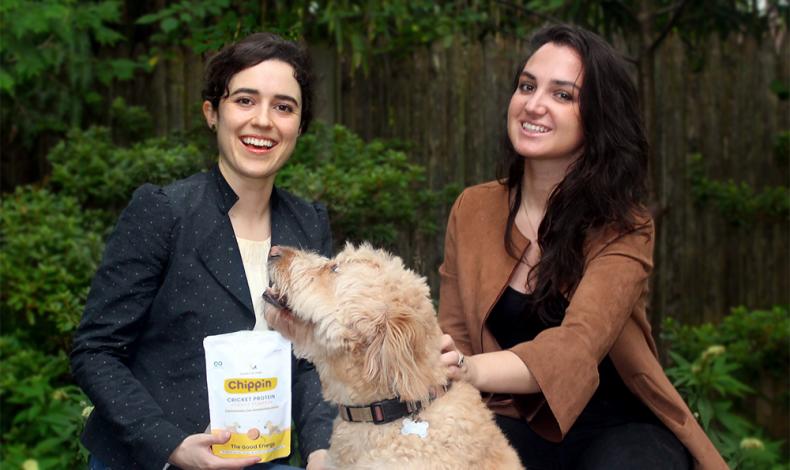iDesign Prize Update: Snacks That Are Good for Your Pup, and the Planet

It all began during Haley Russell’s first year at Wharton. In Philadelphia studying for her MBA, she started a small, vertical cricket farm in her family’s garage.
Her goal? To make cricket protein that was tasty and accessible for use in food, including smoothies, baked goods, and other snacks.
“Insects are an emerging and interesting form of great nutrition that are sustainable, all at the same time,” Russell says.
While building the farm, Russell made an unexpected discovery: her Goldendoodle Wren loves eating crickets. The rest is history.
A Penn-wide entrepreneurship mixer in the spring of 2017 would connect Russell with Laura Colagrande, then a Master of Architecture student at PennDesign pursuing a certificate in Integrated Product Design (IPD). Through their common interests in entrepreneurship, food, sustainability, and animals, the duo would soon become business partners, using their complementary business and design skills, to build and scale what is now known as Chippin—an environmentally conscious food company making all-natural cricket protein snacks for dogs.
Thanks in part to $55,000 in winnings from Russell and Colagrande’s participation in last year’s iDesign Prize, a PennDesign and IPD program in its fourth year, Chippin, which won the judge’s top pick as well as the crowd favorite, officially launched in stores and online in November.
“We created the iDesign Prize to give students who are working on physical products a bit of a boost,” says Sarah Rottenberg, the IPD program’s executive director. A boost Chippin received, indeed—both financially and in confidence.
Russell and Colagrande (MArch’18), who have since graduated from Penn, spent the spring and summer months of 2018 with their heads down, focused on testing their cricket snack product, reiterating it, finding the right partners, and homing in on the perfect packaging, website design, and marketing plan. They traveled to Las Vegas, Los Angeles, Dallas, Austin, New York City, and Washington, D.C., sampling out their product to more than 1,200 “four-legged family members,” as they like to say, mainly at dog parks.
“Wren loves to eat crickets, and loves Chippin,” says Russell, “and her dog friends do, too. That is critical. We have had a lot of picky pups that stand behind Chippin.”
So far, Chippin, which was originally known as Chipper Pet and sells for about $12 a pack, has two flavor concoctions, including apple, cricket, and flaxseed, and peanut butter, cricket, and pumpkin. The idea behind the all-natural ingredients, says Colagrande, is that pet parents want to give their dogs—who are like family—the best variety of food that tastes good and is as nutritious as possible. To make sure the products are top-quality, Chippin has worked closely with experts from Penn’s School of Veterinary Medicine and partnered with board-certified vet nutritionists from the American College of Veterinary Nutrition.
In researching attitudes toward insects, Russell adds, they worked closely with Paul Rozin, a School of Arts and Sciences professor whose research focuses on the psychology behind the emotion of disgust, generally, but also as it relates to food, especially insects.
“One of the things that I often tell people is that it’s extraordinary that there could be a combination of a world-class business school, a school of veterinary medicine, a school of design, and a school of general arts and sciences all within three blocks of each other,” says Russell. “That doesn’t exist at any other institution. Having access to all of these different departments was helpful in our process of gathering feedback, building community, and ultimately developing Chippin.”
For Chippin, a pet’s nutrition is equally as important as the snack’s sustainable impact, notes Colagrande, adding that they’ve designed a product “that is planet-friendly from the inside out.”
That includes its packaging, which can be recycled with TerraCycle. And, best of all, cricket protein packs two-and-a-half times the protein of other meat-based pet foods, Colagrande says, while using just a fraction of the land and water resources that other products use.
“Climate change is a major challenge we are facing, and the food system plays a huge role in it,” Russell says. “Livestock and manure management are together the leading cause of methane gas emissions, and 80 percent of water use goes to agriculture. So, to be able to do something that is positive for the planet is very timely and will continue to be relevant.”
The star of the iDesign show last year, what makes Chippin so compelling, notes Rottenberg, is how hard Russell and Colagrande have worked to not only understand pets’ and their parents’ needs, but also making the case of why switching to cricket protein is so beneficial.
“Both of those things we all saw and we all valued,” Rottenberg says. “It’s food, it’s a bit unusual, but they have really followed a great design process to develop and evolve the product.”
As for Chippin’s future, Russell and Colagrande hope to position the company as the go-to brand for “good for pup and planet foods.”
“This is a world-changing idea,” says Colagrande. “We believe in it so much.”
The iDesign Prize is generously supported by Jay Abramson (W’83, L’86), Laurence Goldberg (W’89), Mason Haupt (W’77), and Kevin Penn (W’83).

